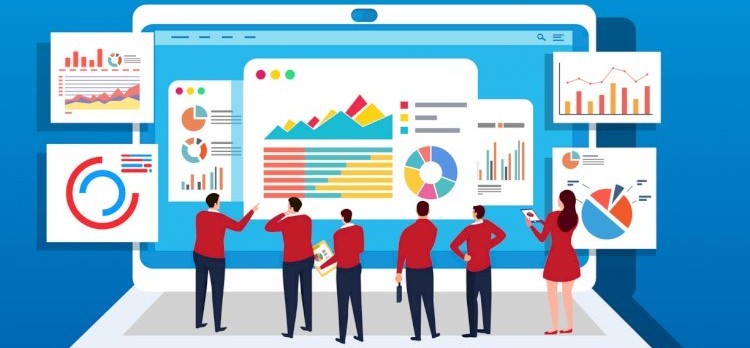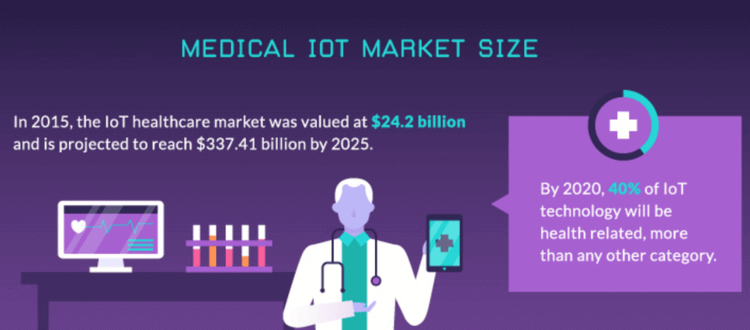There has been more data generated In the last two years than during the whole of human history. It needs to be processed, stored, and analyzed for use. That is the purpose of data collection. It aims to research a particular topic or area and analyze it for making correct decisions. Updated and accurate data can significantly improve the results, whether used for personal, public, or governmental matters.
However, modern technologies no longer cope with vast volumes of information, leading to poor performance, lost revenues, and wasted time. According to Forbes, 95% of businesses have problems managing data and are looking for an effective solution.
In this article, we want to discuss the importance of data management in healthcare, methodology, and the problems companies may face.
Information is the oil of the 21st century, and analytics is the combustion engine.
Peter Sondergaard, Gartner Research.

Data collection (source)
Why data collection in healthcare is crucial
Healthcare is a dynamic industry that implements the latest technologies and instruments to track and analyze information about patients, hospitals, and other medical systems. Data collection tools help to get a clearer picture of a patient’s health, manage information quickly, and share it with other specialists within a single click.
Effective collection and management of information can be a key to the engagement of patients and their treatment. That is why hiring healthcare software developers and getting a customized solution for a business may be one of your best decisions.
Here are the main benefits of data collection in healthcare.
1. Well-informed decisions
Doctors, patients, insurance agents, and other institutions are sure that data collection is important in healthcare, and one of the main reasons is decision-making. Currently, there is no general data on patients and hospitals, so organizations don’t get enough information to understand their patients’ needs.
With the help of research and analytical instruments, it is possible to quickly and effectively collect and evaluate results. Doctors, departments, and hospitals can exchange information remotely, which can even save patients’ lives.
2. Reduction of costs
According to McKinsey’s study, published in the National Library of Medicine, efficient big data analysis can save the U.S. medical industry $300 billion per year. The numbers significantly increase when individual healthcare is involved. For hospitals and other medical institutions, detailed and comprehensive diagnosis and treatment may lead not only to better results but to lower costs.
For individuals, the importance of health data collection is also evident. The collection of complex information and its storage in one place can reduce the number of repeated visits to the doctor and help avoid unnecessary prescriptions.
3. Implementation of artificial intelligence
AI is one of the latest trends, and it has already been introduced to the healthcare industry. With its help, it’s possible to collect information more efficiently and to improve systems automatically. For example, Google has already teamed up with Ascension and Mayo Clinic to enhance cloud storage and implement the latest AI solutions.
The purpose of healthcare data is to save lives and improve the quality of life, so companies and governments are doing their best to offer new solutions. Artificial intelligence has enough capacities to store, process, and analyze vast volumes of information. It can educate itself and make fast and accurate decisions, no matter where a patient is.
4. Storage of all data in one place
There are still many companies and institutions which keep information in different storages. When switching to comprehensive repositories, it is much simpler to access the necessary data on individual and governmental levels. When data is collected and kept in a particular system, all healthcare participants can cooperate and significantly improve the quality of provided services.
Before common databases, records were kept inside a single facility that a person visited. This information was rarely used. On the one hand, it was good for privacy but could significantly harm the industry’s evolution.
If the data is not shared between doctors, researchers, and hospitals, it slows down the development and can cost lives. When healthcare providers have access to a comprehensive picture of a patient's life, they can offer a thorough treatment plan.
5. Market competitiveness
Community health is a complex system that involves hospitals, governments, and third-party agencies like registries and insurance firms. Proper data collection may significantly improve the quality of provided services and lead to strong market positions and higher revenues. To achieve such results, they simply need to use the latest data collection instruments and customized methods.
6. Outbreak prevention
One of the benefits of data collection in the medical field is a chance to prevent epidemics. For example, a woman in New York has unrelated symptoms that are treated separately. But with data collection, doctors may detect other people with the same unrelated symptoms in the area.
With a shared database, doctors and epidemiologists may notice risk factors and trends across different locations and population groups. This can significantly help the society and save lots of lives, especially among patients at-risk.
We know how to develop medical software solutions and have successfully completed many healthcare projects. Contact us and get comprehensive assistance.
Order A Project
Healthcare statistics (source)
Healthcare data storage challenges
Is data important in healthcare? Definitely, yes. However, skeptics believe that problems related to the security of information shouldn’t be dismissed. Here are the main issues concerning data collection that may impact the decision of whether to implement it or not:
Low data quality. One of the biggest challenges is the quality of data. Some databases are more efficient than others. Some use Spreadmart, while others – their own programs. Thus, the process of gathering and processing data, especially handwritten and then scanned, is relatively slow and may lead to numerous mistakes.
Security of data. Protection of information, especially if it concerns sensitive data, has always been an issue not only in the medical field. Companies have to face numerous laws and restrictions when it comes to data storage. For example, a stolen computer from an insurance company may result in a million-dollar fine. Unfortunately, healthcare organizations are not informed on security tools and rarely use them. A good alternative is turning to cloud-based storage.
Difficulties in collaboration. Doctors use different methods for entering data on patients and their treatment: some use EDW, while others prefer traditional Excel spreadsheets. Some physicians lock documents, and others grant access to other specialists. The way medical data is written also matters because every doctor has a unique style and vision. It makes it quite difficult to cooperate, especially virtually.

Data collection and evaluation (source)
Health data collection methods
How is health data collected? It is probably one of the most frequent questions that doctors and businesses ask when deciding to gather and store information efficiently. Fortunately, multiple tools help evaluate projects, attach examinations and protocols, and interact with focus groups.
The first and most crucial step is to choose a method that suits your particular enterprise’s needs and goals. Here are some questions that may help:
1. What information should be collected?
2. What instruments do we need?
3. Is our company using similar tools?
4. What department is responsible for data collection?
After writing down the answers, you will have a better picture of the methods to use, whether observing or analyzing documents. At the moment, the healthcare industry is switching to digital space instead of interviews and papers. Here are the most popular methods of collecting data in healthcare:
Customer relationship management (CRM). These systems allow collecting and handling data from multiple channels and storing them in one place. They also analyze information and are securely stored inside a company. There are operational, strategic, analytical, and collaborative CRMs aimed at specific goals;
Electronic health record (EHR). HER technology is similar to CRM. It helps with collecting and analyzing information and sharing it across hospitals and other institutions. EHRs can include such information as medical history, allergies, immunization, radiology images, and personal statistics. Over 94% of U.S-based hospitals and more than 60% of private medical providers are already using EHR systems;
Mobile apps. Applications that run on smartphones and tablets can connect patients and hospitals, gather information, and store it in databases. They create a fast and secure environment between a doctor and a patient and significantly save time.
At the moment, the market prefers commercial software, but the benefits of custom products are evident. These tools are tailored to a particular institution’s needs and may significantly improve the services’ quality. To find the best option, medical organizations should consider their services, the number of patients and nurses, their budget, and infrastructure.
Our team is ready to help with collecting, storing, and analyzing healthcare data. KeyUA is an experienced development company created for your success.
Contact UsOur experience
Medical data collection is an essential step towards cost reduction and effective decision-making. If you provide health services and want to get comprehensive solutions for maximum efficiency, choosing KeyUA is the right idea. We have 8 years of healthcare experience with over 25 successful products for insurance companies and medical institutions. Our projects meet the highest standards, like HL7& HIPAA, and are easily adaptable to multiple devices.
With our solutions, hospital data collection is fast, secure, and effective. Contact the KeyUA experts and order customized software in pharmaceutics, medical administration, veterinary, insurance, and many other niches.
We will help you to choose the best strategies and technologies for collecting and storing data accurately. Entrust the project to professionals.
Get In TouchComments
Leave a comment








 Unit 1505 124 City Road, London, United Kingdom, EC1V 2NX
Unit 1505 124 City Road, London, United Kingdom, EC1V 2NX

Robin Rai says06/26/2021 9:13 AM
what a lovely blog on the importance of data collection in health care